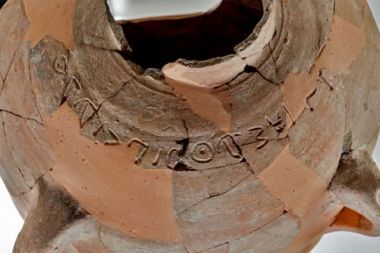Biblical name confirmed by inscription on 3,000-year-old jar

Archaeologists in Israel have pieced together a 3,000-year-old clay jar and found that it bears the same name as a biblical character from the time of King David.
The large ceramic jar, which was broken into hundreds of pieces, was found to be inscribed with the name Eshbaal ben Beda.
While Beda is not a biblical name, Eshbaal or Ishbaal was the son of Saul who fought against David for the throne and who was murdered by assassins (II Samuel 3,4). The researchers, Prof Yosef Garfinkel of the Institute of Archaeology of the Hebrew University and Saar Ganor of the Israel Antiquities Authority, say: "The correlation between the biblical tradition and the archaeological finds indicates this was a common name only during that period."
Garfinkel and Ganor say that Ishbaal ben Beda may have been an important landowner who had his name incised on the jars used to transport his produce.
The jar was found at Khirbet Qeiyafais, identified with the biblical city Shaʽarayim. The city dates from the time of David, that is, the late 11th and early 10th centuries BC. In 2008 the world's earliest Hebrew inscription was uncovered there.
According to Garfinkel and Ganor: "Until about five years ago we knew of no inscriptions dating to the tenth century BCE from the Kingdom of Judah. In recent years four inscriptions have been published: two from Khirbet Qeiyafa, one from Jerusalem and one from Bet Shemesh. This completely changes our understanding of the distribution of writing in the Kingdom of Judah and it is now clear that writing was far more widespread than previously thought.
"It seems that the organisation of the kingdom required a cadre of clerks and writers and their activity is also manifested in the appearance of inscriptions."
The biblical Ishbaal's name is preserved in 1 Chronicles 8:33, but rendered as Ishbosheth in II Samuel. The 'baal' termination recalls the Canaanite fertility god for whom he was named; the 'bosheth' termination means 'shame' and was used by the later Israelite author.











